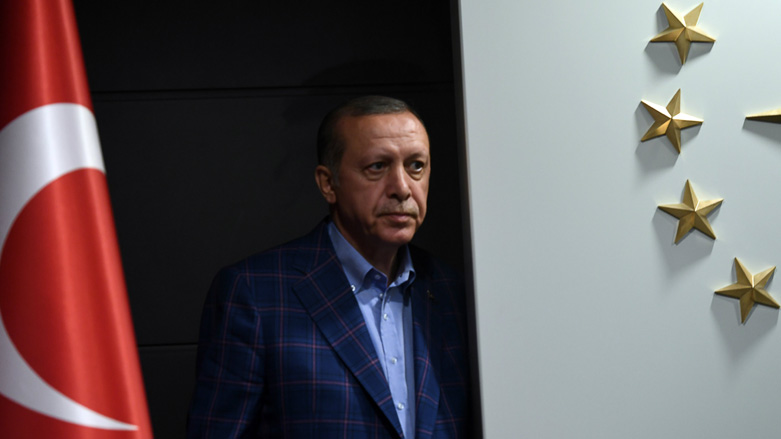Erdogan ignores US warnings, Turkey will buy S-400

WASHINGTON DC (Kurdistan 24) – Turkish President Recep Tayyip Erdogan reaffirmed his country’s intent to acquire the S-400, Russia’s most advanced air defense missile system.
Speaking to reporters following Friday prayers in Istanbul, Erdogan said, “We have concluded the process regarding the S-400s, and our payments for the S-400s continue,” as he explained that the first delivery of the Russian missile system would occur in July.
Erdogan is scheduled to visit Moscow on Monday. That will mark his third meeting with Russian President Vladimir Putin since late January. According to a Russian spokesman, the two leaders are to discuss Turkey’s purchase of the S-400, as well as US plans for a withdrawal from Syria.
Turkey’s repeatedly stated intent to purchase the S-400 has roiled relations with Washington, as have Turkish threats to attack Kurdish forces in northeastern Syria.
On Monday, the Pentagon announced that it was suspending “deliveries and activities” related to Turkey’s acquisition of the F-35, America’s newest, most advanced fighter jet, until Turkey cancels its order for the Russian air defense system.
Turkey has already invested over $1 billion in the F-35 program. It is supposed to receive 100 planes, while ten Turkish defense companies have been producing parts for the plane. However, the Turkish investment would be forfeit, if Ankara’s involvement in the F-35 program were cancelled, while the Turkish companies would lose the contracts.
On Wednesday and Thursday, Turkish Foreign Minister Mevlut Cavusoglu visited Washington to attend a NATO Foreign Ministers Conference marking the 70th anniversary of the founding of the alliance. The S-400 figured prominently in discussions of Turkey’s bilateral relations with the US, as well as its ties to NATO.
On Wednesday, Vice President Mike Pence, on the sidelines of the NATO conference, issued a remarkable warning to Ankara, as he stated that Turkey’s purchase of the S-400 could endanger its membership in NATO.
Later that day, Cavusoglu met with Secretary of State Mike Pompeo, who repeated US concerns about the S-400 purchase, while warning that any Turkish attack on northeastern Syria, where US, French, and British forces are located in support of the Kurdish-led Syrian Democratic Forces, could precipitate “potentially devastating consequences.”
Finally, on Thursday—after hearing those warnings from senior US officials and before leaving Washington for Miami, Florida—Cavusoglu met with National Security Adviser, John Bolton. Presumably, Bolton reinforced those warnings.
“We have been clear and consistent in emphasizing our grave concerns on the S-400 acquisition with representatives of the Turkish Government on numerous occasions and at the highest levels,” a senior administration official told Kurdistan 24.
However, nothing seems to have affected Erdogan’s decision. Four Turkish pilots are training on the F-35 at a US Air Force base in Arizona. Turkey’s Defense Minister, Hulusi Akar, used that point on Friday to claim that four planes had been delivered to Turkey, as did Erdogan himself.
“We are one of the eight partners of this project,” Akar said. “We have given a serious amount of money”—i.e. over one billion dollars. “Three aircraft have been delivered and the fourth will be delivered today.”
But the “training of Turkish pilots in Arizona is no guarantee that the F-35s will be ultimately delivered to Turkey,” Dr. Aykan Erdemir, a former Turkish parliamentarian and now a Senior Fellow at the Foundation for Defense of Democracies, told Kurdistan 24.
“Erdogan and his aides continue to downplay the growing crisis in U.S.-Turkish relations and pretend as if they can purchase and operate both the S-400s and the F-35s without any problems,” Erdemir continued. “This rhetoric could succeed in persuading Erdogan’s loyalists at home, but will be of no use in solving the bilateral stalemate.”
Indeed, CNBC, the business channel of the US television outlet, NBC, reported on Thursday that Lockheed Martin, which manufactures the F-35, is “preparing to make massive adjustments” to its production plans. Turkey produces some seven percent of the parts for the F-35, and arrangements for new manufacturers would have to be made, if Turkey were excluded from the F-35 program.
At the same time that doubts have arisen over whether Turkey will receive the F-35, the US is considering selling the plane to five other countries—Singapore, Greece, Romania, Spain and Poland, Reuters reported on Thursday.
A major US split with Turkey would have significant implications for the Kurds.
This reporter had the opportunity to chat briefly with former Vice President Joe Biden in 2017, shortly after he left office. Biden affirmed his sympathy for the Kurds, saying that Masoud Barzani, then President of the Kurdistan Region, was a “good friend.”
Asked why the Obama administration had not done more for the Kurds, Biden replied, “because of Turkey.”
